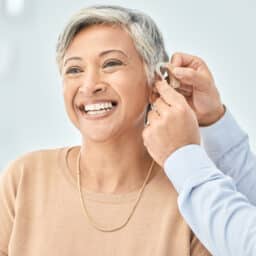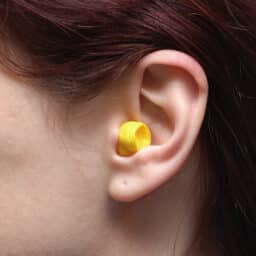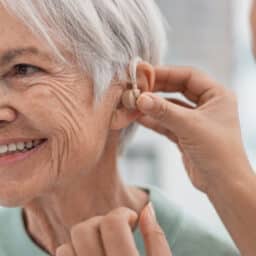Why Embracing Hearing Aids at a Young Age Matters

As a young adult, the idea of beginning hearing loss treatment can feel scary or even wrong. You may think that you’re too young to seek treatment for your hearing loss. Or that your hearing loss is not pronounced enough to require intervention. Whatever your reason for hesitation, it can be helpful to consider the…
Navigating Hearing Loss from Temporal Bone Tumors

A diagnosis of a temporal bone tumor can be intimidating, but learning about these conditions and their impact on hearing can provide comfort and help you find a less stressful path forward. The Temporal Bone and Hearing Located at the base of the skull, the temporal bone plays a vital role in our auditory system….
Hearing Aids: Improving Social Connections and Quality of Life

Building and maintaining meaningful relationships is an essential part of life. However, hearing loss can pose significant challenges to connecting with others and enjoying a vibrant social circle. If you find that your hearing loss is affecting your ability to engage socially, hearing aids may offer a solution. For those living with hearing loss, the…
What Infections Can Lead to Hearing Loss?

Viral infections can have a significant impact on hearing, leading to both congenital and acquired hearing loss. Let’s look at a few infections that can lead to hearing loss and how to protect against them. What Infections Cause Congenital Hearing Loss? Congenital hearing loss refers to hearing loss that is present at birth. Two viral…
How to Know If Bluetooth Hearing Aids Are Right for You

Today, those with hearing loss can not only improve their ease of communication with hearing aids but also integrate seamless connectivity with Bluetooth® technology. Let’s delve into the advantages Bluetooth hearing aids offer, how they function and what to consider when choosing them. When to Use Bluetooth Hearing Aids Bluetooth hearing aids are designed to…
New Year, New Name: What to Know About Better Speech and Hearing Month’s New Name

The National Association for Hearing and Speech Action (NAHSA) has been commemorating May as Better Speech and Hearing Month since 1972. This month-long observance is dedicated to raising public awareness about the 1.5 billion people worldwide who live with hearing loss. However, as of 2024, the event will be rebranded as National Speech-Language-Hearing Month. This…
What Are Some Great Times to Carry Earplugs

Hearing loss can occur gradually through prolonged exposure to loud noises or suddenly due to an intense noise burst. The severity of the impact depends on the decibel level, with sounds exceeding 70 decibels (dB) posing a threat over time while those surpassing 120 dB causing immediate damage. You may wonder how to protect your…
What To Know About Presbycusis

Presbycusis, or age-related hearing loss, is a common condition affecting roughly two-thirds of Americans aged 70 or older. It is the most prevalent type of hearing loss globally. It’s often overlooked due to its gradual onset and subtle symptoms. So, if you find yourself straining to hear conversations in bustling environments like Sweet Beans Coffee…
How to Track Tinnitus Flare-Ups
Surveys estimate that between 10% to 25% of adults have tinnitus. Tinnitus is a condition characterized by the perception of sound, usually a ringing or buzzing, without an external source. It can range from a mild annoyance to a significant disruption of your daily life. Understanding how your tinnitus behaves and tracking its patterns is…
How To Accommodate Your Hearing Loss Over the Holidays

With the holiday season fast approaching, you’re probably going to be juggling countless events, shopping lists and more. With all that you have on your plate, it can feel easy to let stress bubble up and take away from your enjoyment of the season. The holidays can present even more unique challenges for those with…
